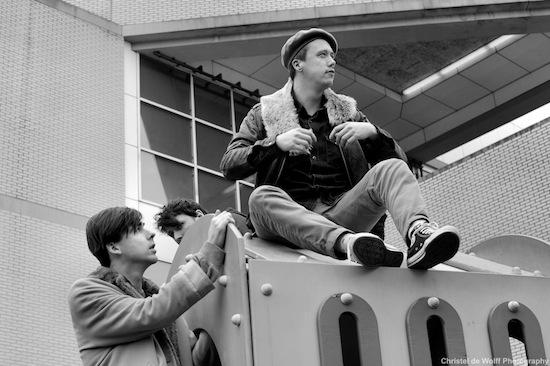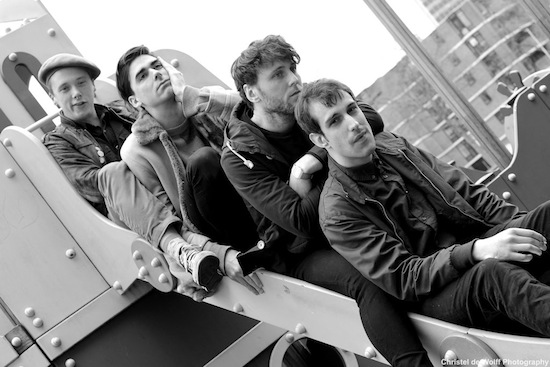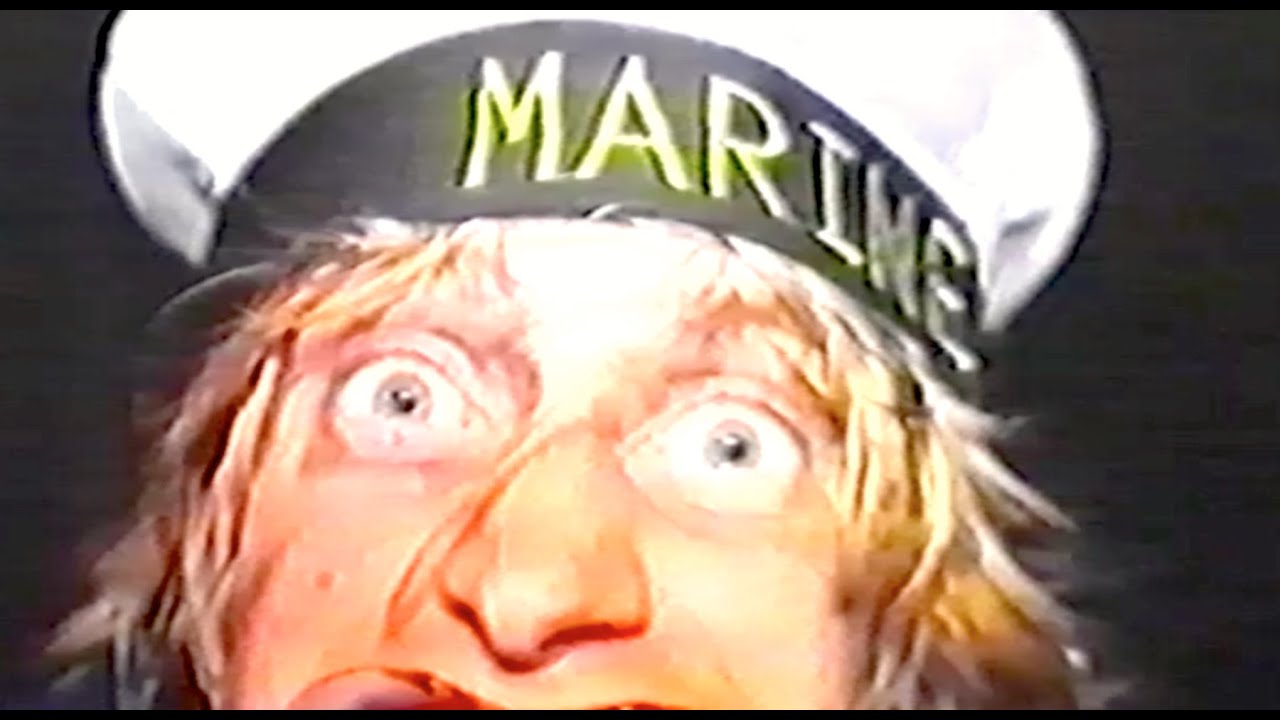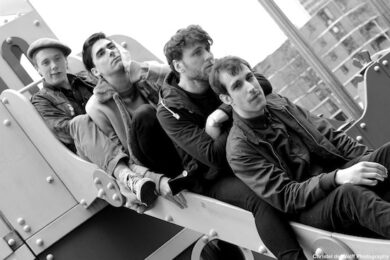This article is a feature about an indie guitar band. A band of four white working class lads, proud of their roots and happy to be associated with their home city, happy to be defined as a guitar band, happy to see virtues in "passion", "hard work" and "honesty" and (speaking for a couple of them) into football.
The band in question, however, is not Kasabian but Rats On Rafts, who are very far from your average indie guitar combo. Boasting a ferocious live reputation (this writer can only think of Belgrade’s Repetitor as a comparably combustible live act) they are obsessed with fusing pop music with spacewards explorations in sound and time; examining the entrails of "classic" guitar rock for future guidance. Because of this, Rats on Rafts’ music – especially on their new LP, Tape Hiss – can sound like a gateway to a re-imagined, "future-Odinist" present. Massive, intuitive ur-scally flights of fancy, forged from steel and concrete. Also – and maybe subliminally – the band draw on the spirit of Rotterdam’s hedonistic postwar poets such as Riekus Waskowsky, Cor Vaandrager, Jules Deelder and Frans Vogel; the jazz-loving lunatics who created ‘de Nieuwe Stijl’ and ‘Garde Sivik’, the writer-drinkers who promoted their poetry through advertising copy for supermarkets and washing powders. Proud provincials and internationalists, Rats (whilst steering clear of the gin and speed) tread similar fault lines between promoting populism, explorations of place, and continual deconstructions of their art.
I get a chance to have a chat with the band on the day of their release party at V11, a boat converted into an English theme pub in Rotterdam’s Wijnhaven. It’s a really nice place, and nowhere near as annoying as you’d imagine. The band mooch about and – in between the usual chat – I grab guitarist Arnoud Verheul, drummer Joris Frowein and singer David Fagan, and ask a few questions. It’s not an interview in the classic sit down sense; as, despite them being a very courteous bunch, they sometimes go into their shells when being interviewed. It’s more a case of soaking up what they say and do, and trying to capture what has fascinated me about this open but slightly mysterious band over the last five years or so. The more I think about them, the more connections I make with Rotterdam.
A statement created for an advert by people’s poet and arch Rotterdam wreckhead Frans Vogel, it’s also a classic invocation of Rotterdam. Roughly translated it means: "It’s all bollocks!" This is the talk Rotterdammers like. The volksstad; the tough, bombarded, continually rebuilt Rotterdam. The Rotterdam that the new incomers – the smart phone classes, the harbingers of bullshit "play at shoppes", "funky" renewal – maybe want to project onto themselves. It can also apply to Rats on Rafts, who have a gobby, outsider status in the Netherlands. Many in the mainstream entertainment media here seem to have trouble in understanding their essence. They also embody many aspects of this huge, restless, but strangely intimate city. Hailing from multicultural, multinational working class backgrounds, they both uphold the Rotterdam convention of becoming "respectable" through hard work, and yet make records that sound like a big fuck off to any notion of commercial success. Their gig at V11 reflects this; it’s dead easy to write about Rats on Rafts and miss the point; for sure they are noisy and angry (at one point singer David Fagan howls at the sound man to sort his monitor out; nearly hurling his guitar off into the stage in frustration). Yes there’s the "working class" thing (there is a fair smattering of football lads among the pop fans and aesthetes). But this band are genuinely accessible and out-there; obsessed with making long drawn-out and groovy pop jams that sound like a runaway turbine engine; their dark, burning soul urging them to crash through to somewhere else by using the power of sound alone. At times their gigs get goggle-eyed and shamanic; a mix of Elevators and early Bunnymen. On this night, they cover the caustic fluff of Lee & Nancy’s ‘Some Velvet Morning’, making the track sound like ‘Outside Your Door’, or ‘Ghost Rider’.
Rotterdam: Reputation
Rotterdam’s genuinely multicultural, and possibly the most open and welcoming of all the cities in the Netherlands, yet it was also the base of Pim Fortuyn. Do you find it a contradictory city to live in? A city full of different attitudes?
David Fagan: "No I don’t find it a contradictory city to live in, every city has different people, every person has different views, there will always be a person who says "B" when you say "A" and vice versa. If you’re talking about the traditional mentality of this city, I guess it is straight forward. You say what’s on your mind, you get your work done, be good to people who are good to you, and tell people to fuck off if they act like pricks. ‘Just don’t over exaggerate, and be honest’; this is something you come across a lot here."
It has a long tradition of literary heroes, lots of underground poets. Why do you think that is?
David Fagan: "Perhaps because of the underdog position the city has and the character like I just described; which always seems to flow through these people, they are very straight forward, say what they think.
"You mentioned Fortuyn, too. Back when he was alive, everybody was talking about him. He was interesting… purely because he was so open and eloquent about his own beliefs. Obviously I didn’t agree with him at all, and he got so lost in what he was doing, he lost sight of the consequences of what he was saying."
The Pim Fortuyn Plaats commemorating this contradictory character’s murder in 2002 can be found in the city centre. Some of its football fans (no teams mentioned) like to (ahem) kick off in "the traditional manner", and who knows about Hangar 24? Rotterdam, however, is going through yet another (mainly architectural) makeover; driven by a "public-private" ebullience and nit-picking prudence, especially when it comes to funding the alternative arts. A lot of venues, like Watt/Nighttown or Eksit – the place where the Sex Pistols played – seem to close, reopen and close again, with increasing regularity.
Rotterdam: Rebuilding
This city is the gateway to a country it has very little in common with. Serving its needs but always looking out. And the port is a city within a city, a microchipped Isengaard, never sleeping, always coining it. Rotterdam makes the money Amsterdam spends. One of the few buildings that really get the heritage renovation treatment here is The Hotel New York, the last stop for many before leaving for the New World. Maybe because the building’s an emblematic "goodbye" to many peoples’ past lives.
This is a world port, one that recycles the waste, cleans the shit, and refines the raw materials. But now it’s being totally renovated and rebuilt. What do you feel about all the physical changes you see around you?
David Fagan: "Sometimes it upsets me, I used to really like the old Centraal Station building for example, but I guess it’s good to build, enjoy, destroy and create again. Don’t forget that after Rotterdam was bombed in the Second World War, they used that as an excuse to get rid of a lot of buildings they wanted to get rid of anyway. My father grew up playing on debris of what was left after that war, and he pointed out to me that it’s nothing new; they recycle different parts of city all the time. As for venues, it’s kind of the same, I used to dislike it but I can laugh about it at times."
Arnoud Verheul: "You know; I really like all the changes. I really like all the changing architecture; it’s exciting to see all the new buildings going up. We put that on the cover, the old city and the beginning of the changes. And it needs to keep changing, because it means we’re forwards looking."
Joris Frowein: "Rotterdam can also feel like a small town; especially in the outer bits. I live in Rotterdam West, and out there, it’s not like a big city. I only remember I’m living in the city when I bike into the centre. But I think Rotterdam’s identity is to keep changing, and wrecking stuff; it’s certainly more interesting than Amsterdam! I feel at home in Groningen too. That has a similar attitude to here."
Amsterdam
Amsterdam, waar lech dat dan? One of the great covers is that of this Euromasters’ classic Gabba single (on, yes you guessed it, Rotterdam Records) where a wankered Euromast sends a wave of glowing, E-d up piss over the city of Amsterdam; sending its pretty buildings sky high. A record that sounds like the stand pipes bashing the sand flat, to create the foundations of a new high rise. My (very unoriginal) theory about the rivalry between the two cities stems from the buildings. Amsterdam, in the words of writer Michael Winner, is a city that is "a Disney version of itself". Rotterdam’s architecture is all about dynamism; Van Nelle’s factory, the Euromast, the Kunsthal, Centraal Station (old and new), the Erasmus Bridge, the redevelopment of the docks. Even the planned giant Superbowl monstrosity in the city’s culture park falls into this category. Amsterdam can do fuck all, but here, they can flatten everything and start again. As philosopher Liesbeth Levy says, "Because Rotterdam was bombed flat, it’s a city without a memory." The day after a party is also a day without memory in Rotterdam.
Arnoud Verheul: "I’d hate the town to be like Amsterdam, and sort of never changing."
David Fagan: "Amsterdam often feels like a place that looks to rip you off on every corner. Actually let’s not bother talking about Amsterdam eh? It’s a silly place [LAUGHS].
Analog Sound And Tape Hiss
Your new record sounds extraordinary; given you always record in Rotterdam; do you see your sound as a reflection of your environment? Like Kiem, say?
(Kiem created images and noises from the scraps found in the wharves and in the container city. Talking of Kiem… legend has it that they’d play smashed off a concoction of psilocybin and white whine, the mushies pressed through the neck of the bottle. Kiem’s ‘The Moneyman’ was covered by Rats themselves; a celebration of the "party hard, spend all you have" kultur captured by Otto Snoek’s photos, using the shittiest, cheapest, dustiest stuff imaginable. The Kiem link is strong; legendary saxophonist, Ger "Sax" Van Voorden often played with Rats, guesting on their debut LP.)
David Fagan: "Ach, you know, I think our sound reflects how we feel and what we enjoy the most. Rotterdam is always there, but in this case the city’s not as something that is ‘strong’, but more like something that is broken up. And you know, I have never thought about Rotterdam in that ‘trashy’ way. Every city has lots of bad taste, but hey it’s a working class city so people are going to want to lose some steam over the weekend, man!"
Joris Frowein: "I think the labouring mentality influences me. Because I am working class and I think I listen to music in the same way. You just have to work hard and work it all out later. You can hear the music after you’ve finished… Ach it’s not my thing, I just play the drums [LAUGHS]."
Arnoud Verheul: "Rotterdam has shaped me for sure. As I said, I think you see it on the cover. It’s where I’m from and it’s certainly a part of who I am."
(Tape Hiss, part-designed by Arnoud, has a dramatic cover, with the bombed city and the river Maas playing key roles. The city’s skyline and river also appeared on their last LP, the scally/poppy The Moon is Big.)
And all analog. Why?
David Fagan: "Yes. Everything was record, mixed and mastered on reel to reel tape. Because all the digital options this age has brought us serve mostly for comfort and luxury, we wanted the quality we heard in records recorded, mixed and mastered on analog equipment. We came to the conclusion that soundwise, it really makes a big difference for a group like ours. There is something you feel; like the distortion starts to move, reverb starts to sound like a space and, digitally these things seem to lose their physical presence. Funny thing is, people have said they can actually hear the difference when they finally hear the LP in the record and CD versions, and are amazed."

Football
David Fagan: "You can’t escape it in Rotterdam. Football’s not to everyone’s taste here, though, and in a way it’s a bit like Glasgow. You can immerse yourself in the football culture here, but there’s always an escape; the ‘art through architecture’ trope is obvious in both cities. But back to football in Roffa. Wim van Hanegem, ‘Iron’ Rinus Israel, Wim Jansen; hard, chippy, stubborn and at times self-destructive players. Hanegem famously argued himself off the pitch in the 1976 European Championships semifinal. Hanegem, whose motto was, ‘First the man, then the ball’, now photographs the wildlife in his back garden.
Football. You scratched "Feyenoord" on the B-side of the LP… Tell me about that relation and how does it affect you as a band?
Arnoud Verheul: "I like running [LAUGHS]."
David Fagan: "When I was really young I always supported Feyenoord and mostly Liverpool because of my Irish family. But when I got older I started to realise there was hardly any loyalty in football; it was mainly about money and I started to realise that these clubs once had entirely different teams that played there, because of love for the game and the club, and I found it too painful to see lads earning millions of euros crying like babies on the pitch, trying to get a penalty… to me that shows how much they lack as players.
"I grew up in the same street as Ricky van Haaren who now plays for Dordrecht, and when he started playing for Feyenoord, I slowly started to gain my interest for football again. I always wanted to see him play. Nowadays I really enjoy watching Feyenoord because most of the players are young lads from the youth academy, great talented players like Terrance Kongolo, Jordy Clasie, and Sven Van Beek, the last lad being one who even looks like an old fashioned player. It really makes a big difference. I hope someday that will happen at Anfield as well."
Rotterdam: Epilogue
"Roffa". A city that has a long link with making money, (lots of money) and spending it on getting trashed in the most no-nonsense manner it can find. It can be a paradise of kitsch; but not the comfy-cushioned kitsch you see in most other Dutch cities. A city of real parties; Mike Pickering and Gonnie Rietveld working out a warehouse sound they later brought to the Hacienda, Ted Langenbach’s revels symptomatic of a "make do and mend" culture that still managed to out-sparkle the self-regard of Amsterdam. Pubic hair parties; parties held at the cultural centre WORM, where people have been known to cover themselves, and then their audience, in pickled cabbage and cold brown beans. For the crack. A city which constantly dreams up intellectual naughtiness; Joep van Lieshout’s dockside utopia; an artist’s blueprint of a post-nuclear world; one full of witty, self-destructive poets, unable to settle down, unable to stop the pub monologues, falling back on settled, hardworking families to get them out of the mess of their lives. So a city that encourages joking, pessimism, or rebirth? It’s sometimes really hard to pick away at the seams. A bit like Rats On Rafts.
Tape Hiss is out now, co-released on the band’s own label Kurious Records, and Subroutine Records




